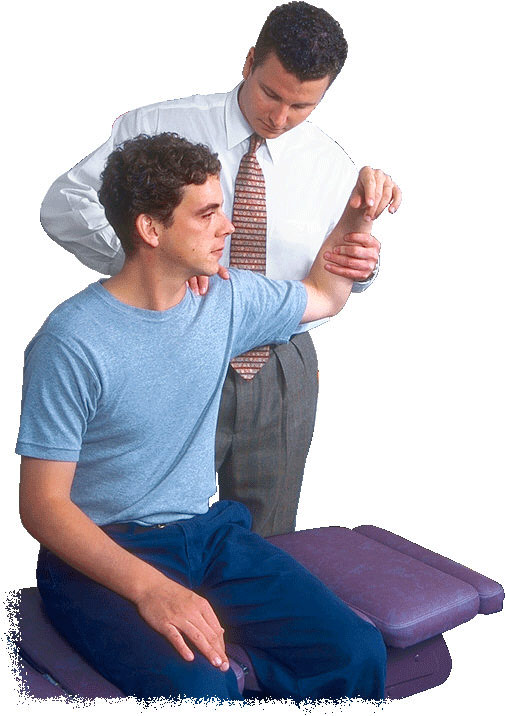Shoulder Pain
The most interesting thing about shoulder pain is that our Spinecare chiropractors often find it can be coming from your spine!
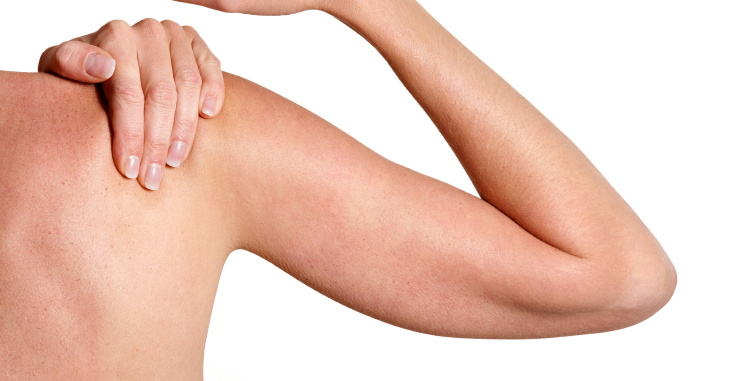
What makes up the shoulder joint?
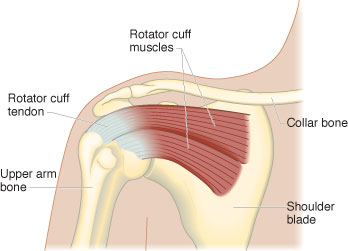
The 4 muscles (and their tendons) that make up the rotator cuff include:
- Supraspinatus
- Infraspinatus
- Teres Minor
- Subscapularis
Your shoulder joint is made up of three bones: your clavicle (collarbone), your scapula (shoulder blade) and your humerus (upper arm bone). The main joint in your shoulder is the big ball and socket joint known as the glenohumeral joint. The lining of your glenohumeral joint has a thin, smooth synovial membrane that lets the top of your humerus move and roll around in the joint capsule smoothly.The second joint in your shoulder is the acromioclavicular (AC) joint which is located between your acromion (part of the scapula) and your clavicle.The bones of your shoulder are all held in place by your muscles, tendons and ligaments.Your rotator cuff muscles sit mainly around your scapula (shoulder blades) at the back and run through your shoulder joint to help hold the joint in place and provide mobility and strength.Your tendons are the tough cords of tissue that attach to each end of your shoulder muscles and strengthen the muscle where it attaches to the bone.
Your ligaments attach around your shoulder joint to provide support and stability. We also have two filmy sac-like structures called bursa that allow the smooth gliding between your bones, muscles and tendons. They act like cushions and protect the rotator cuff from the bony arch of the acromion.
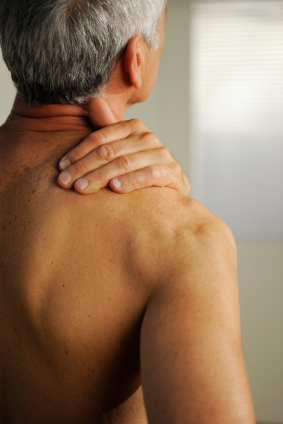
What causes shoulder pain?
Neck Problems
When you think of your shoulder pain, have you ever thought that it could be coming from your neck? More often than not our Spinecare chiropractors find that the pain across your shoulders and into your shoulder joint can be caused and/or contributed by problems with your neck!
If spinal dysfunction with your neck or neck pain occurs, muscles and nerves related to your shoulder can be affected. The nerves that exit from your neck can be impinged or irritated, which in turn can send pain into your shoulder and down into your arm.
Some muscles in your neck, such as the trapezius muscle, extend down from your neck into the back of your shoulder joint. Muscle tension or spasm of these muscles can also refer pain into your shoulder and down into your arm.It’s vitally important to have your shoulder complaint assessed thoroughly to determine the correct cause of your shoulder pain!
Rotator Cuff Disorders
The rotator cuff is a group of muscles and tendons that help to move your shoulder and hold your shoulder joint in place. Rotator cuff disorders usually result from inflammation or damage to these muscles or tendons. When it’s your tendon that becomes inflamed, rotator cuff tendinitis is often the resultant cause for discomfort.
The reason for the tendon to become inflamed can be from a variety of causes which include: general wear and tear that occurs over time, activities that require repetitive shoulder motion (especially above shoulder level), heavy lifting, trauma, or poor posture.
The most frequent rotator cuff disorders that our Spinecare chiropractors see is either Supraspinatus or Infraspinatus tendinitis. If you have a serious shoulder injury and the inflammation of your tendons is left untreated, it may cause the rotator cuff muscles or tendons to tear.
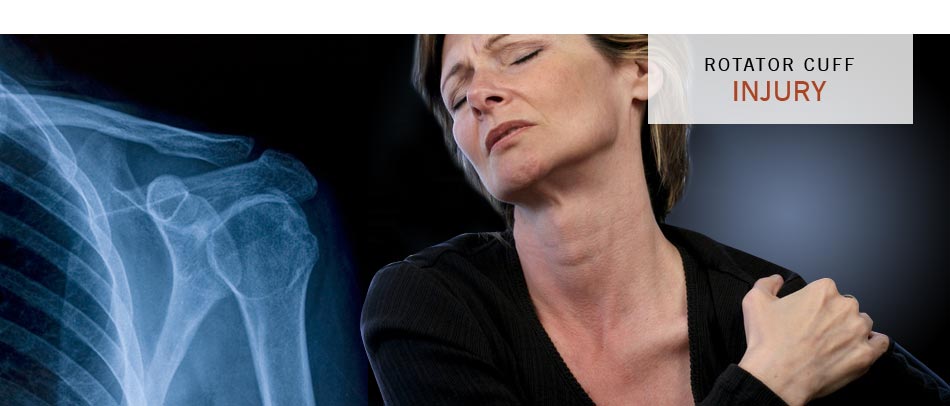
The pain experienced with rotator cuff problems is often felt at the front or on the side of the shoulder, particularly when you raise your arm or lift something above your head. You may also notice the pain more when lying down at night. Severe injuries can cause weakness of your shoulder muscles, restricted shoulder movement and ongoing discomfort that can also radiate into your upper arm and down towards your elbow.
Shoulder Bursitis
Shoulder bursitis is classified as inflammation of the sub-acromial bursa within the shoulder. The bursa is a fluid-filled pad that sits under the highest part of the shoulder. The inflammation can be caused by general wear and tear that occurs with age, activities that require constant or repetitive shoulder motion (especially above shoulder level), heavy lifting, trauma, or even poor posture.
Shoulder bursitis is a common condition that presents to our Spinecare Chiropractic clinics. So often our chiropractors find that bursitis can be accompanied by neck and upper thoracic dysfunction as well as secondary shoulder problems. As a result, our Spinecare chiropractors find that a thorough overall assessment is necessary to address all possible shoulder related aggravations.
Frozen Shoulder
Frozen shoulder, also known as adhesive capsulitis is characterized by progressive pain and stiffness in the shoulder. At times your shoulder joint can become so stiff, it may be hard to move the shoulder joint at all. The pain is often felt deep in the shoulder joint and is made worse by lifting motions and also laying on that shoulder at night. The exact cause of this condition is unknown, but it sometimes develops following other shoulder injuries.It some cases it’s thought that overuse of an injured shoulder can cause the shoulder muscles and connective tissues to stiffen up.Frozen shoulder is classified as a self limiting condition, which means that it resolves by itself without treatment. However, once the pain has subsided the stiffness may still remain. Treatment for frozen shoulder is crucial to help decrease the length of the condition and also to restore maximum functional capacity in the long term. Most people with frozen shoulder tend to improve within 6 months to 2 years.

Shoulder Arthritis
Arthritis of the shoulder can be a condition experienced more often in older age but is too frequently blamed for many shoulder conditions. Shoulder arthritis can be described as progressive joint pain, tenderness, swelling and stiffness. Both rheumatoid arthritis and osteoarthritis are the most common types of arthritis and can affect the shoulder joint.
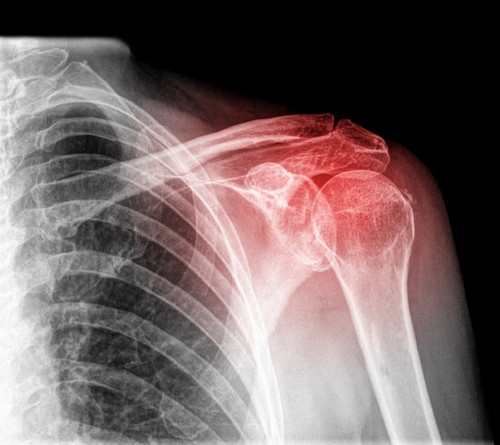
How can Spinecare Chiropractic help Shoulder Pain?
While many people look for medication such as pain killers and anti-inflammatories when they suffer from shoulder pain, these should only be considered as temporary relief. While medication may reduce the symptomatic pain, it does not address the underlying problem.Spinecare chiropractors can help by firstly providing a thorough Initial Consultation to determine the cause of your shoulder pain. Once the cause is determined, our Adelaide chiropractor’s can sit down and explain your findings to you at your Report of Findings.
Our chiropractor’s will recommend a course of care if appropriate and outline their expectations before beginning any treatment.Spinecare Chiropractic prides itself on providing safe, professional and painless treatment for shoulder pain relief. As well as our work in the clinic, our chiropractors may also provide advice, stretches or exercises to speed up your recovery and reduce the chance of future relapses.
